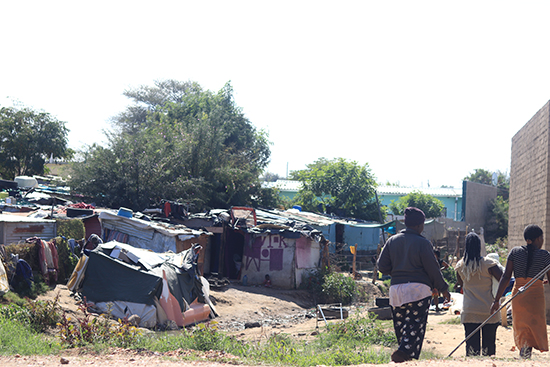Aletta Shikololo
Surviving on a daily basis does not come easy for Yvonne Antonnia (37) and her one-year-old daughter, who live in the elements and amidst filth in a riverbed running through Freedom Square in the Katutura Central constituency.
After relocating from Otjinene village in the Omaheke region last year in search of employment, Antonnia’s hopes for a better life quickly turned into a desperate fight for survival. Upon arriving in Windhoek, Antonnia soon faced the harsh reality that finding employment was more challenging than she had ever envisioned. She found herself without a roof over her head, with limited resources and a growing sense of hopelessness. During this dire time, she encountered a community living in the riverbed and made the difficult decision to join them. Now, Antonnia and her daughter sleep on a tiny single mattress in the open, mere meters away from exposed sewage water.
“We live here; this has now become our home for almost two years,” she said. During the recent months of continuous rainfall, Antonia and her daughter have resorted to using a plastic cover over their blankets to shield themselves from the rain. Now, as winter sets in, they endure freezing temperatures, further exacerbating their already challenging circumstances.
Antonnia’s situation is not isolated; she is among eight others who also live harshly in the same inhospitable riverbed. Other riverbed inhabitants are
better off than Antonnia, with about 58 others having access to flimsy structures they erected themselves out of left-over pieces of plastic and wood.
Nghitilavali Kandjato (40) has been living in this riverbed for four years.
He said he has no plan of moving elsewhere, as the riverbed community has become a family that assists one another during tough times.
“I’ll also try to make my own shack here because it’s better than sleeping in the open. The hardships of life have brought us together and made us
family,” said Kandjato. Most of these community members engage in various odd jobs to sustain themselves. Some work as car guards, while others eke out a living by selling scrap materials. Some preferred not to disclose their specific occupations, only mentioning that they “hustle at night.”
Illegal settlers
The riverbed community is situated alongside the main road by Jacob Marengo secondary school, and it is said to have originated from a solitary shack.
Over time, more and more individuals began to migrate to the same riverbed. Within a relatively short time, the population expanded to 66 residents, including 14 children as young as a few months to five years.
While acknowledging their settlement is illegal, they assert they have no alternative dwelling options, and insist the area has become their cherished home.
“We have nowhere to go; each of us has a different story to tell about why we reside here. Why would we choose a riverbed of all places if we had choices? Life is not as easy as it may look,” narrated Helena Gawises, who has been living in the area for six years.
The living conditions in the riverbed are deplorable, with garbage, rubbish and the constant stench of sewage surrounding their makeshift dwellings.
Their struggle for survival unfolds in the very place they call home – a riverbed where they reside and carry out every aspect of their daily lives, including cooking, bathing and relieving themselves. Gawises narrated: “We face significant challenges without access to basic amenities, such as water and electricity. We rely on candles for illumination – and for water, we depend on a nearby house where we pay five dollars for five
litres. During the day, we must cross the road to find a suitable place near the school to meet our sanitation needs. However, at night, we relieve ourselves in the river due to safety concerns, especially for women”.
However, some of the residents who cannot afford to pay for water resort to using sewage water.
They claim to have reported their plights to the constituency councillor, Rodman Katjaimo; however, no assistance has been provided. All efforts to get comment from Katjaimo proved futile by the time of going to press.
“Officials will usually just come here to so-call inspect, but they don’t come back,” Gawises added.
For many years, the City of Windhoek has been grappling with illegal inhabitants in informal settlements.
During the rainy season, the city relocates residents in flood zones to higher ground or to areas free of health hazards. Surprisingly, this community was never relocated despite some community members having lived there for more than 15 years.
Inquired on this matter, City of Windhoek spokesperson Harold Akwenye claimed he is unaware of this community.
“I’ll inspect that area,” he told New Era. Akwenye added that many people in shacks are considered illegal, as they do not own the land on which they live.
He said the city is caught between a rock and a hard place, and it has to deal with the contradiction of
legalising the illegal.
“In other words, they are trying to make the wrong right by providing those land grabbers services. If the City does provide land grabbers with basic services, it means the city is somehow encouraging people to grab land, as services shall be provided afterwards. That will be a wrong message that the city will send out to the residents, encouraging lawlessness,” he explained.
Akwenye added that “people shouldn’t expect much sympathy from the city if they grab land, especially at topographies where services are impossible to supply”.
However, he assured the public the city is in the process of formalising informal settlements to dignify the lives of people by providing them with ownership of the land they occupy.
“But it’s a process that needs passion,” he said.


